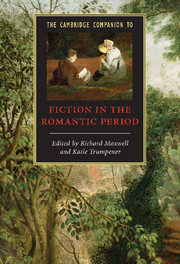Book contents
- Frontmatter
- Introduction
- 1 The historiography of fiction in the Romantic period
- 2 Publishing, authorship, and reading
- 3 Gothic fiction
- 4 The historical novel
- 5 Thinking locally: novelistic worlds in provincial fiction
- 6 Poetry and the novel
- 7 Orientalism and empire
- 8 Intellectual history and political theory
- 9 Women writers and the woman’s novel: the trope of maternal transmission
- 10 Tales for child readers
- 11 Sentimental fiction
- 12 Fiction and the working classes
- 13 The Irish novel 1800-1829
- 14 Scotland and the novel
- Further reading
- Index
- Series List
7 - Orientalism and empire
Published online by Cambridge University Press: 28 January 2009
- Frontmatter
- Introduction
- 1 The historiography of fiction in the Romantic period
- 2 Publishing, authorship, and reading
- 3 Gothic fiction
- 4 The historical novel
- 5 Thinking locally: novelistic worlds in provincial fiction
- 6 Poetry and the novel
- 7 Orientalism and empire
- 8 Intellectual history and political theory
- 9 Women writers and the woman’s novel: the trope of maternal transmission
- 10 Tales for child readers
- 11 Sentimental fiction
- 12 Fiction and the working classes
- 13 The Irish novel 1800-1829
- 14 Scotland and the novel
- Further reading
- Index
- Series List
Summary
In a 1762 review of John Langhorne's Solyman and Almena, the Monthly's critic stated that there was so little of “invention or originality” in the work that “a reader, who is but moderately acquainted with this modish kind of literature, may anticipate most of the incidents”; “in truth,” he went on to add, “few of the Oriental Novels differ very essentially from each other.” Even as reviewers sometimes complained that moral tales such as Langhorne's bore few signs of the properly Eastern style of the Arabian Nights (first translated as Les Mille et une nuits by Antoine Galland in 1704), works of this kind represented perhaps the dominant if by no means the only form of “oriental” narrative published in English, for most of the eighteenth century. Well-known works such as Samuel Johnson's Rasselas (1759) and John Hawkesworth's Almoran and Hamet (1761) conceived of the East at the level of neoclassical generality, without much interest in accuracy or specificity of detail, and - although they reflected on topical issues - employed a broadly applicable language of abstract morality, so that one critic noted that the insight into the human condition in Rasselas might be acquired “without going to Ethiopia.” The contemporary sense of what the oriental amounted to in this context was capacious enough for “Igluka and Sibbersik,” subtitled “A Greenland Tale,” to be included in The Orientalist: A Volume of Tales after the Eastern Taste (1764). Charles Johnstone presented The History of Arsaces (1774) as a fiction concerned with “the universal manners of Nature,” and stated that “greater particularity would only have been pedantry,” insisting that the reader would excuse him “not having paid more minute attention to the manners of the times and countries, in which the various scenes of the work are laid.”
- Type
- Chapter
- Information
- The Cambridge Companion to Fiction in the Romantic Period , pp. 129 - 142Publisher: Cambridge University PressPrint publication year: 2008

